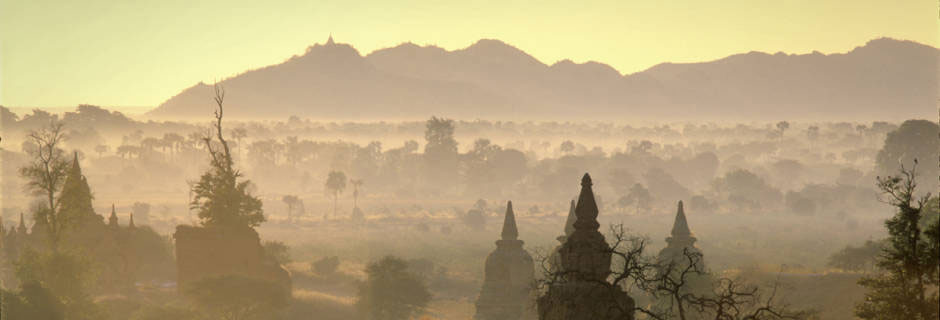
Myanmar, The Golden Land

Myanmar is the largest country in the South-east Asia. It has a total area of 676,577 square kilometers .It shares borders by Bangladesh and India on the Northwest, by China on the Northeast, by Laos on the East and by Thailand on the Southeast. Myanmar lies between Latitudes 4’31’ and 28’31’ North and Longitudes 92’10’ and 101’11’ . The country stretches 2090Km from North to South and 925Km from East to West at its widest points. It also has a total length of 2832 Km of coastlines facing the Bay of Bengal and the Andaman Sea. Over 50 percent of the total land area is covered with forests.
Climate
Generally , Myanmar has three seasons . The monsoon or raining season is from May to October , The cool dry season is from November to February and the hot season from March to May . The most pleasant time to visit Myanmar is the open season from mid-October to mid-May during which temperatures are moderate. Temperature ranges from 21 degree Celsius in the dry cold season and 35 degree Celsius in the hot season.
Historical Background
Early civillation in Myanmar date back to the 1st century with archaeological evidences of the Pyu Kingdom of Thayekhittaya (Sriksetra) , Beikthano ( Visnu ) anf Hanlin.
In 1044, King Anawrahta, a Myanmar ruler, united the region and founded the First Myanmar Empire at Bagan, that lasted nearly 250 years. King Bayintnaung (1551-1581A.D) had founded the “Second Myanmar Empire” at Hanthawaddy (Bago). The “Third Myanmar Empire” was founded by the King Alaung Paya in A.D.1752. After that, British moved into Myanmar and it became a British Colony after three “Anglo-Myanmar Wars” that had taken place in 1825, 1852 and 1885 respectively.
During the World War II, the Japanese troops had occupied Myanmar from 1942 to 1945. Myanmar became a sovereign independent country on 4th January 1948.
Capital
Naypyidaw (Pyinmanar) Changed from Yangon on 27 March 2006. Yangon is the city for trade, economy and culture.
The People
Myanmar is a union of over 135 nationalities with their own languages. The major races are the Kachin , the Kayah , the Kayin , the Chin ,the Bamar,the Mon ,the Rakhine and the Shan. The population of the Myanmar is over 52 million with the Bamar, the majiority race, making up about 70 percent.
Religian
Over 85% of the Myanmar People embrace Theravada Buddhism. There are also Christians, Muslims, Hindus and some animists.
Culture
Myanmar lies between two great civilizations , India and China , but it has developed its own distinctive culture . Buddhist has a great influence on the daily lives of the Myanmar people. The people have preserved the traditions of close family ties, respect for elders and simple native dress. While tolerance and contentment are the characteristics of the people, Myanmar hospitality is legendary.
Language
The official language is Myanmar . English is widely spoken and understood.
U Thant, Secretary-General of the United Nations ( 1961 – 1971 )
U Thant, who served as Secretary-General of the United Nations from 1961 to 1971, was chosen to head the world body when Secretary-General Dag Hammarskjold was killed in an air crash in September 1961.
U Thant was born at Pantanaw, Burma, on 22 January 1909, and was educated at the National High School in Pantanaw and at University College, Rangoon.
Prior to his diplomatic career, U Thant’s experience was in education and information work. He served as Senior Master at the National High School, which he had attended in Pantanaw, and in 1931, he became Headmaster after winning first place in the Anglo-Vernacular Secondary Teachership Examination.
He was a member of Burma’s Textbook Committee and of the Council of National Education before World War II, and was an Executive Committee member of the Heads of Schools Association. He was also active as a free-lance journalist.
In 1942, U Thant served for a few months as Secretary of Burma’s Education Reorganization Committee. In the following year, he returned to the National High School as Headmaster for another four years.
U Thant was appointed Press Director of the Government of Burma in 1947. In 1948, he became Director of Broadcasting, and in the following year, he was appointed Secretary to the Government of Burma in the Ministry of Information. In 1953, U Thant became Secretary for projects in the Office of the Prime Minister, and in 1955, he was assigned additional duties as Executive Secretary of Burma’s Economic and Social Board.
At the time of his appointment as Acting Secretary-General of the United Nations, U Thant had been Permanent Representative of Burma to the United Nations, with the rank of Ambassador (1957-1961).
During his diplomatic career, U Thant served on several occasions as Adviser to Prime Ministers of Burma.
U Thant began serving as Acting Secretary-General since 3 November 1961, when he was unanimously appointed by the General Assembly, on the recommendation of the Security Council, to fill the unexpired term of the late Secretary-General, Dag Hammarskjold. He was then unanimously appointed Secretary-General by the General Assembly on 30 November 1962 for a term of office ending on 3 November 1966.
U Thant was re-appointed for a second term as Secretary-General of the United Nations by the General Assembly on 2 December 1966 on the unanimous recommendation of the Security Council (resolution 229, 1966).
U Thant retired at the end of his second term in 1971 and he died on 25 November 1974 after a long illness. He was 65 years old.

